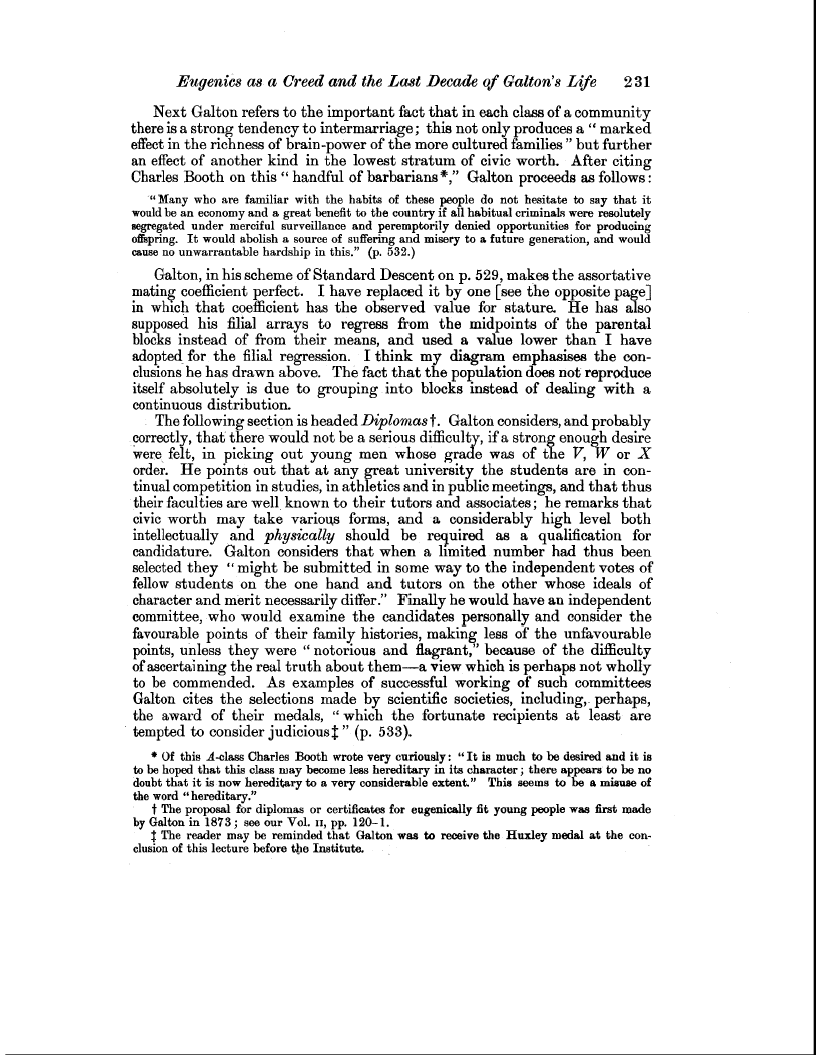| ||||||

OCR Rendition - approximate
Eugenics as a Creed and the Last Decade of Galton's Life 231 Next Galton refers to the important fact that in each class of a community there is a strong tendency to intermarriage; this not only produces a " marked effect in the richness of brain -power of the more cultured families " but further an effect of another kind in the lowest stratum of civic worth. After citing Charles Booth on this " handful of barbarians*," Galton proceeds as follows ""Many who are familiar with the habits of these people do not hesitate to say that it would be an economy and a great benefit to the country if all habitual criminals were resolutely segregated under merciful surveillance and peremptorily denied opportunities for producing offspring. It would abolish a source of suffering and misery to a future generation, and would cause no unwarrantable hardship in this." (p. 532.) Galton, in his scheme of Standard Descent on p. 529, makes the assortative mating coefficient perfect. I have replaced it by one [see the opposite page] in which that coefficient has the observed value for stature. He has also supposed his filial arrays to regress from the midpoints of the parental blocks instead of from their means, and used a value lower than I have adopted for the filial regression. I think my diagram emphasises the conclusions he has drawn above. The fact that the population does not reproduce itself absolutely is due to grouping into blocks instead of dealing with a continuous distribution. The following section is headed Diplomas 1-. Galton considers, and probably correctly, that there would not be a serious difficulty, if a strong enough desire were, felt, in picking out young men whose grade was of the V, W or X order. He points out that at any great university the students are in continual competition in studies, in athletics and in public meetings, and that thus their faculties are well. known to their tutors and associates; he remarks that civic worth may take various forms, and a considerably high level both intellectually and physically should be required as a qualification for candidature. Galton considers that when a limited number had thus been selected they " might be submitted in some way to the independent votes of fellow students on the one hand and tutors on the other whose ideals of character and merit necessarily differ." Finally he would have an independent committee, who would examine the candidates personally and consider the favourable points of their family histories, making less of the unfavourable points, unless they were " notorious and flagrant," because of the difficulty of ascertaining the real truth about them-a view which is perhaps not wholly to be commended. As examples of successful working of such committees Galton cites the selections made by scientific societies, including," perhaps, the award of their medals, " which the fortunate recipients at least are tempted to consider judicious$ (p. 533). * Of this A-class Charles Booth wrote very curiously: "It is much to be desired and it is to be hoped that this class may become less hereditary in its character; there appears to be no doubt that it is now hereditary to a very considerable extent." This seems to be a misuse of the word "hereditary." t The proposal for diplomas or certificates for eugenically fit young people was first made by Galton in 1873; see our Vol. ii, pp. 120-1. $ The reader may be reminded that Galton was to receive the Huxley medal at the conclusion of this lecture before the Institute.
|